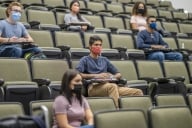You have /5 articles left.
Sign up for a free account or log in.
Whatever happened to cheating? The question occurred to me the other day, when I turned on the television and found myself watching School Ties, a 1992 movie about a posh New England boarding school starring Brendan Fraser and Matt Damon. Damon cheats on an exam. Fraser sees him. When the teacher finds Damon's cheat sheet on the floor, he challenges the cheater to come forward, or else the class to bring him forward, according to the dictates of the school honor code.
Eventually, Damon is named and expelled. But he is identified by the head prefect, not Fraser. Both should have themselves come forward sooner. "The honor code is a living thing," declares the dean. "It cannot exist in a vacuum." Precisely, the trick of the movie is to provide a vacuum -- the time is 1955 -- and then let just enough of real-world air bubbles leak in so that, alas, we secretly wish that the vacuum -- leaving aside the anti-Semitism that contaminates the world portrayed in this particular movie -- could somehow have remained sealed.
What clarity back then! Damon does cheat. He knows what he did is cheating. There is no nonsense on his part about having made an "error of judgment," and no cant on anybody else's part about "extenuating circumstances." Everybody else recognizes what cheating is. Nobody has to ask. "Someone has robbed you of your honor," the teacher tells the class. "If I ignore it, you will rob me of mine as well."
Today, however, the very word, "cheating," sounds, well, crude, perhaps a bit antique, even irrelevant. I asked a friend of mine to tell me a cheating story. He immediately recalled a student of his who was getting an A. Come the last paper. It was plagiarized. My friend decided to give the student a final grade of B. "You plagiarized your final paper," he told the student when he came round to inquire about his grade next semester. The student just shrugged and walked away.
In the world of School Ties, the student who cheats has dishonored himself. In the world of grade inflation and Enron, though, the student has merely been caught. How to account for the difference? One might just as well try to explain the loss of the idea of "honor." Can it only function in highly circumscribed (perhaps ultimately military) contexts? As an operative value in normal academic circumstances, has "honor" now been as utterly undone by a student culture of excuses, just as this culture has been thoroughly saturated by a larger American culture of victimization?
Hard questions. Let me try to concentrate instead on one feature: how the occasion for cheating has changed. In School Ties, this occasion is a test. In my friend's instance it is a text. At least some of the reason that cheating leads such a baffled existence in the academy at the present time is that a text is not a test. In each case, the standards by which to judge whether cheating has occurred in any one specific instance seem to be the same. They are not.
The circumstances in which a test takes place are, virtually by definition, controlled, while those through which a paper gets written are not. It is possible to monitor the space where a test is being given; it is not possible to monitor where a paper is written. In addition, time is different in each case: a test is designed to be completed at a designated place during a certain period of time, whereas a paper is merely subject to a deadline; it can actually be written over any amount of time, anywhere.
What this means in evaluative practice is not only that the opportunities to cheat (just to continue to use this word) are enormously expanded. The nature of cheating itself changes accordingly -- to the despair of every teacher, beginning with those who teach freshman composition. The very fact that "plagiarism" must be carefully defined there defers to the absence of what the dean in School Ties refers to as a vacuum. (Could cheating even be punished -- in his terms -- if one has to begin by defining it?) It also testifies to the near-impossibility of judging a paper on SUV's or gay marriage or God-knows-what that has been cobbled together out of Internet sources whose fugitive presence, sentence by sentence, is almost undetectable.
Furthermore, to the student these sources may well be almost unremarkable, with respect to his or her own words. What is this business of one's "own words" anyway? What if the very notion has been formed by CNN? How not to visit its site (say) when time comes to write? Most students will be unfamiliar with a theoretical orientation that questions the whole idea of originality. But they will not be unaffected with some consequences, no less than they are unaffected by, say, the phenomenon of sampling and remixing as it takes place in popular culture, especially fashion or music.
"Plagiarism" has to contend with all sorts of notions of imitation, none of which possess any moral valence. Therefore, plagiarism becomes -- first, if not foremost -- a matter of interpretive judgment.
Cheating, on the other hand, is not interpretive in the same way (and, in the world of School Ties, not "interpretive" at all). No wonder, in a sense, that test gradually has had to yield to text. It is almost as if the vacuum could not hold. By the present time, the importance of determining grades (in part if not whole) by means of papers acquires the character of a sort of revenge of popular culture -- ranging from cable television to rap music -- upon academic culture.
I do not mean to slight the hundreds or thousands of occasions where tests (beginning with the SAT) remain the evaluative instrument of choice. I do mean to explore why cheating is something enacted today by students who just shrug when told of it. Or becomes something confronting teachers who are perplexed when deciding what to do about it. Are the stakes now simply too low, at least at the undergraduate level? You try (say) to get students to learn some minimal rules about citation. You try to stay away from some more searching consideration about why citation is necessary in the first place. You give as few tests as possible.
Of course, you have to provide grades. So you inflate them. Or rather, the whole academic culture, which breathes inflation, virtually heaves onto the grade sheet a grade that, well, you could justify (you reason), although in an ideal world it would simply be too high. You're not cheating to choose the higher grade. In a decisive sense, it's simply being chosen through you.
The phenomenon known as "grade inflation" is not the same as cheating. Grade inflation simply possesses the immense advantage of grinding up all sorts of edgy moments from both sides of the equation and spewing
them out in discursive mush.
Finally, you also read the newspapers. The other day there was a story about a student from Serbia, a basketball player, whose failing grade was allegedly changed by her Ohio State instructor in "Rural Sociology" after she was asked to do so by an OSU booster. Why? The student was having "personal problems." What exactly were they? Her life might be endangered if she had to return home. Talk about "extenuating circumstances"! How to speak of "honor" -- or whatever would be the value preventing a grade change-- once life itself is at stake? But there was more.
It turns out that the booster says he was asked to speak to the instructor by the basketball coach. It further seems that the booster was also acting as the student's sponsor and host family, a role that involved payment by the university. Suddenly, circumstances shift, and do not seem quite so extenuating (or even the same circumstances).
Meanwhile, it seems grades cannot be changed without the approval of the department chair. So was he or she in on the extenuation? By the end, we are almost in the realm of fiction, and it would make happier sense if the chair were actually Serbian. However, the journalistic report remains unhappily literal, or as much as a wider public will ever learn, anyway.
So what to conclude? That cheating has expanded so much that it now includes or comprehends many routine academic practices (including grade changing, or even a subject such as Rural Sociology)? It's hard to know what to think about cheating anymore, which is one reason why it's easy to relax before movies such
as School Ties.
I missed the fatal exam subject in the movie. Symbolically, it should be Latin. Those were the days! Not the least of the reasons Latin is such an excellent subject was that it appeared to make the determination of whether or not cheating had occurred as clear as the dative case. In contrast, part of the problem with a subject such as Rural Sociology is that all a poor dishonest student can do with it, if pressed, is to plagiarize. Meanwhile, while the rest of us continue to struggle with all manner of extenuating circumstances, "cheating" steals away in quotation marks.








